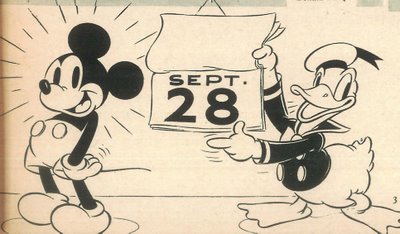
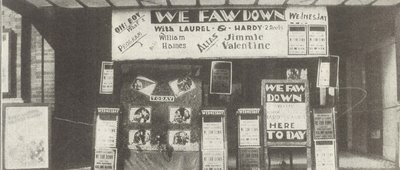

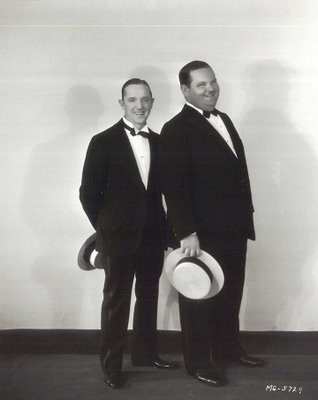 Fads and Flaps Of Yesteryear
Fads and Flaps Of YesteryearHaving grown up in a world saturated by media, we’ve all seen the overnight assault of new fads and catchphrases inspired by music, movies, and television shows. I can remember walking through my neighborhood in the Fall of 1965, wondering why all the kids now prefaced observations with, Would you believe …?, and footnoted every conversation with Sorry About That, Chief. By the fifth such encounter, I’d finally assembled the puzzle. Seems everyone had watched Get Smart the night before, and I was the final initiate to a whole new vocabulary shared by every hep kid on the street. We assume these pop cultural tom-toms beat exclusively for our generation, but the Roaring 20’s had its own complement of hep kids as well, all of them hot wired to radios and Victrolas long before there was TV and internet downloads. Exhibitor Wally Akin of Kennett, Missouri had his own Get Smart experience in April 1929 as he ambled down the main street of that small town trying to figure out how to sell his upcoming program at the Palace Theatre. I overheard a little girl say, "We faw down and go boom", Wally recalled. Before I walked three city blocks there were at least ten more children saying the same thing … Looking over my bookings, I found we had Stan Laurel and Oliver Hardy in a two-reel comedy titled "We Faw Down." This phrase being on the public’s tongue, I decided to feature the comedy instead of the long feature. The photo above shows the front display Wally came up with. His full-length show was Alias Jimmy Valentine with William Haines, but the real attraction was We Faw Down. We packed the theatre to the door on our worst night in the week. There’s no doubt but what showman Wally knew his onions --- surely Hal Roach's hot new comedy team caught the wave of that popular slang phrase as well. The thing had actually originated with a jazz tune called I Faw Down An’ Go Boom, by a pair of songwriters, James Brockman and Leonard Stevens. It flew up the charts by virtue of having been recorded by top artists of the day, including Billy Murray and The Midnight Ramblers, Annette Hanshaw, Eddie Cantor, and Cliff Edwards. By December 29, 1928, the day They Go Boom was released, everyone was whistling the nonsense ditty and borrowing variations of its title for conversational merriment.
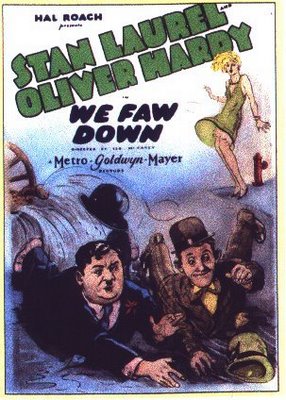
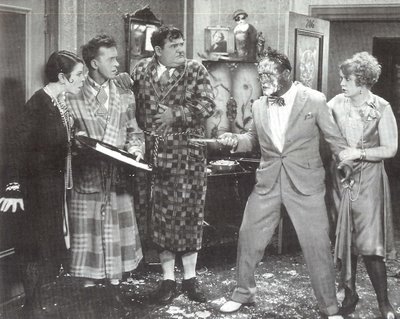
The only thing Laurel and Hardy borrowed from I Faw Down An' Go Boom was (part of) its title. None of the lyrics would have lent themselves to silent comedy, as there were the usual naughty references common to jazz age songs, comical voice effects, and even a bit of japery about Wall Street. Actually, We Faw Down included its own music and effects score on recorded disc, being the second Laurel and Hardy with sound accompaniment. I Faw Down An’ Go Boom does not figure into the track, however. Instead, we hear That’s My Weakness Now over the titles, and again during the body of the short, along with several other popular tunes of the day. The short itself is the usual L&H domestic farce. If anything a little more ribald than usual, We Faw Down inspired this diatribe from an exhibitor in Spearville, Kansas. A comedy with just as suggestive scenes as it is possible to show without showing the real thing. Dirt, vulgar, obscene, and any other filthy name you wish to call it, it will fit every reel. W.J. Shoup’s furious manifesto ended with a call for industry, if not government, intervention --- What is needed in the making of pictures today is to clean house of most of the present producers, so we can have something to show our patrons that is entertaining and pleasing, without being so filthy. It’s possible Mr. Shoup of the DeLuxe Theatre was provoked by that closing gag where all the men jump out apartment windows sans trousers --- Where, oh where, was our censor board when this was passed? So not only were Laurel and Hardy current with pop culture references --- they were cutting edge in matters of bawdy content as well. Looks like we’ve been underestimating these boys!
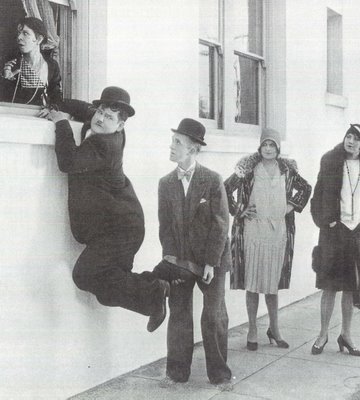
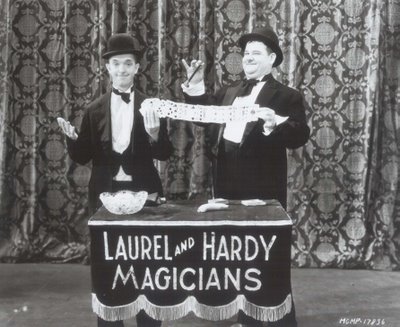

As more bands covered I Faw Down An’ Go Boom, its prominence continued through 1929. Laurel and Hardy would go back to the well at least twice. The Hollywood Revue Of 1929 found the comedians engaged in a bungled magic act that culminates with Oliver Hardy falling into an oversized cake, then plaintively looking at the camera. I faw down and go splat, he says. To modern viewers, it’s an uncharacteristic (if not off-putting) line, but 1929 audiences got the joke and surely had their laugh. September 21, 1929 saw the release of They Go Boom, a talking Laurel and Hardy that utilized another spin on the song title but nothing else. Fads had more longevity in those days when it took longer for them to penetrate the marketplace. Even as late as 1945’s Warner cartoon, A Gruesome Twosome, Tweetie Pie was lamenting the poor putty tat that fell down and went boom. Google the venerable phrase right now and you’ll find numerous modern references. Referencing We Faw Down and They Go Boom will take you to a DVD series called The Lost Films Of Laurel and Hardy. These are, for the most part, silent comedies, but a few talkies turn up in this group as well, including They Go Boom (on Volume 4). The only source for We Faw Down with the original music/effects score is a German DVD (the one included in The Lost Films Of Laurel and Hardy has a random track culled from other discs). If you have a multi-region player, it’s well worth the trouble to get the German DVD. We Faw Down was the last of the synchronized scores awaiting rediscovery. It plays much better with this original accompaniment. There’s no dialogue, of course, but plenty of knocks on doors, telephones ringing, etc., and even dubbed laughter for both Laurel and Hardy in several scenes (not their own, but a neat effect). Tracks for seven of these comedies have now been retrieved after years of apparent loss --- Habeas Corpus, We Faw Down, Liberty, Wrong Again, That’s My Wife, Bacon Grabbers, and Angora Love. Each are enhanced by the vintage music and sound punctuation. I’m told that all of these, plus the balance of Laurel and Hardy’s silent output, is being remastered for a forthcoming DVD box set. I hope this will come sooner rather than later. A lot of us are surely looking forward to that release.
8 Comments:
Outstanding post, with fascinating L&H lore and excellent historical documentation.
That said, a whole day has passed since you ran the "Pre-Code Photos" -- isn't it time to post some more?
Please keep on the track of the rumored Laurel & Hardy DVD set. That would definitely be worth whatever the going rate.
Great photos, too, never seen them before. Just looking at those lobby cards outside the theatre makes me want to jump into a time machine, grab them and come back before they're missed.
Actually, the phrase enters L&H lore well before We Faw Down - and, perhaps, before the hit song. In From Soup to Nuts, released March 24, 1928 (and shot toward the end of '27), Stan and Ollie play hapless butlers for a newly-rich couple (Anita Garvin and James Finlayson) trying to enter high society. Throughout the film, Ollie keeps slipping while trying to carry an oversized cake, and inevitably winds up face-first in the frosting. The first time this happens, Hardy looks up, gives us that marvelously coy smile, and a title card states "I faw down."
Now, just when did the song enter the picture? Could it be Brockman and/or Stevens saw From Soup to Nuts and were inspired?
If you like the music of this era (novelty and otherwise), check out the webstreams of this program:
http://www.wamu.org/programs/hjsn/
In the Three Stooges' 1953 short "Goof on the Roof," Shemp says "I faw down" after falling through the roof of the boys' house.
Absolutely brilliant..you're a pip!
Love the images....stunning stuff.
Looking back at We Faw Down is very different.
Many thanks
Glynne
Thanks Glynne --- Always nice to get comments on a piece from way back (nearly two years!). Glad you liked it. Yikes --- here it is, July 2008 and we're still waiting for that DVD set I referred to in the post!
I never knew the story of this phrase...when I first heard it, it was in a movie, but one newer than these.
In THE ANDROMEDA STRAIN, Arthur Hill and Kate Reid are using a remote control camera to study a satellite, in order to find whatever it is that decimated the population of a small town when it fell back to Earth there. Reid wants to move more quickly that Hill's deliberate pace studying the device, and lets him know her impatience.
Hill reminders her that they have a protocol that should not be changed, regardless of the situation..."we must follow established procedure". To which Reid replies "Established procedure faw down go boom".
Post a Comment
<< Home